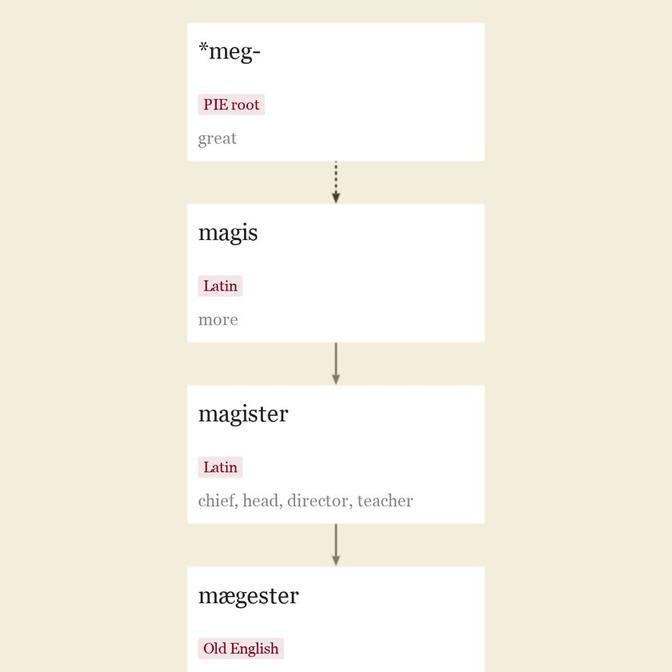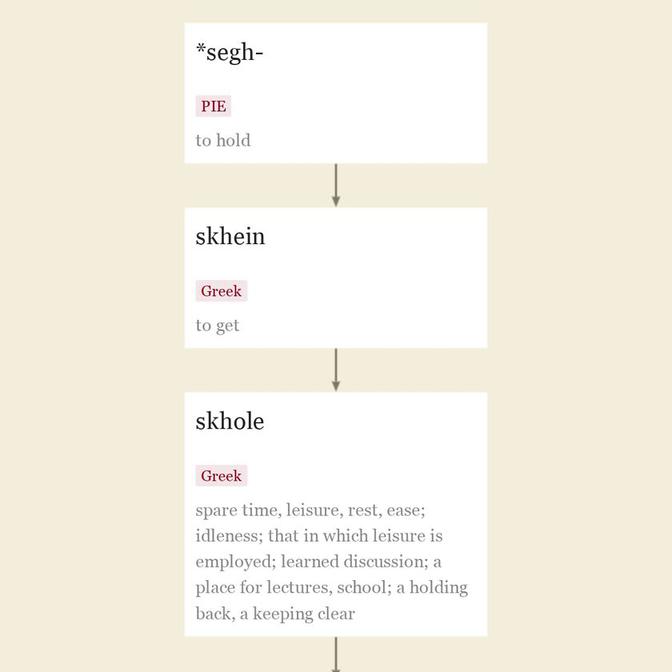Entries linking to school-master
late Old English mægester "a man having control or authority over a place; a teacher or tutor of children," from Latin magister (n.) "chief, head, director, teacher" (source of Old French maistre, French maître, Spanish and Italian maestro, Portuguese mestre, Dutch meester, German Meister), contrastive adjective ("he who is greater") from magis (adv.) "more," from PIE *mag-yos-, comparative of root *meg- "great." The form was influenced in Middle English by Old French cognate maistre.
From late 12c. as "man eminently or perfectly skilled in something," also "one who is chief teacher of another (in religion, philosophy, etc.), religious instructor, spiritual guide." Sense of "master workman or craftsman, workman who is qualified to teach apprentices and carry on a trade on his own account" is from c. 1300. The meaning "one charged with the care, direction, oversight, and control of some office, business, etc." is from mid-13c.; specifically as "official custodian of certain animals kept for sport" early 15c. (maister of þe herte houndes; the phrase master of the hounds is attested by 1708). As a title of the head or presiding officer of an institution, late 14c.; as "captain of a merchant vessel" early 14c.
In the broadest sense, "one who has power to control, use, or dispose (of something or some quality) at will," from mid-14c. Also from mid-14c. as "one who employs another or others in his service" (in which sense the correlative word was servant, man, or apprentice); also "owner of a living creature" (a dog, a horse, also, in ancient contexts a slave); paired with slave in the legal language of the American colonies by 1705 in Virginia.
In academic sense "one who has received a specific degree" (translating Medieval Latin magister) it is attested from mid-13c., originally "one who has received a degree conveying authority to teach in the universities;" master's degree, originally a degree giving one authority to teach in a university, is from late 14c.
Also used in Middle English of dominant women. From 1530s as "male head of a household." As a title or term of respect or rank, mid-14c. As a title prefixed to the name of a young gentleman or boy of the better class not old enough to be called Mr., short for young master (late 16c.). Sense of "chess player of the highest class at national or international level" is by 1894. Meaning "original of a recording" is by 1904.
As an adjective from late 12c. Master-key, one that will open ("master") a number of locks so differently constructed that the key proper to each will open none of the others" is from 1570s. Master race "race of people considered to be pre-eminent in greatness or power" (typical in reference to Nazi theories of the Aryan race, perhaps based on German Herrenvolk) is by 1935. From 1530 as "artist of distinguished skill;" old masters is attested by 1733.
Master bedroom, "bedroom designed for the use of the owner of the property," as opposed to bedrooms for children or guests, is by 1919 in U.S. home-builders publications (e.g. Building Age, April 1919). It seems to be based on the English master's bedroom (by 1903) "bedroom of a headmaster or other master at an English boarding school or other similar institution."
The top floor was treated much the same as the two lower ones. Here the closet was made just a bit larger so as to allow for a bathtub, thus pushing the partition forward, making the front room less deep than the rooms below, yet paradoxically larger, because it takes in the whole front of the house. This is what is known in English advertisements as the "Master's bedroom." [The House Beautiful, June 1921]
[place of instruction] Middle English scole, from Old English scol, "institution for instruction," from Latin schola "meeting place for teachers and students, place of instruction;" also "learned conversation, debate; lecture; disciples of a teacher, body of followers, sect," also in the older Greek sense of "intermission of work, leisure for learning."
This is from Greek skholē "spare time, leisure, rest, ease; idleness; that in which leisure is employed; learned discussion;" also "a place for lectures, school;" originally "a holding back, a keeping clear," from skhein "to get" (from PIE root *segh- "to hold") + -olē by analogy with bolē "a throw," stolē "outfit," etc.
The basic sense of the Greek word is "leisure," which passed to "otiose discussion" (in Athens or Rome, the favorite or proper use of free time), then it came to be used for the place for such discussion.
The Latin word was widely borrowed (in addition to Old French escole, French école, Spanish escuela, Italian scuola; Old High German scuola, German Schule, Swedish skola, Gaelic sgiol, Welsh ysgol, Russian shkola).
The meaning "students attending a school" in English is attested from c. 1300; the sense of "school building" is by 1590s. Sense of "people united by a general similarity of principles and methods" is from 1610s; hence school of thought (by 1848). As an adjective by mid-18c., "pertaining to or relating to a school or to education."
School of hard knocks "rough experience in life" is by 1870; to tell tales out of school "betray damaging secrets" is from 1540s. School-bus is from 1908. School days is from 1590s. School board "local committee of education" is by 1836; school district "division of a town or city for the management of schools" is by 1809.
Trends of school-master
More to Explore
updated on February 01, 2022
Dictionary entries near school-master
schooled
schoolgirl
school-house
schooling
schoolmarm
school-master
schoolmate
schoolroom
school-teacher
schooner
schottische


